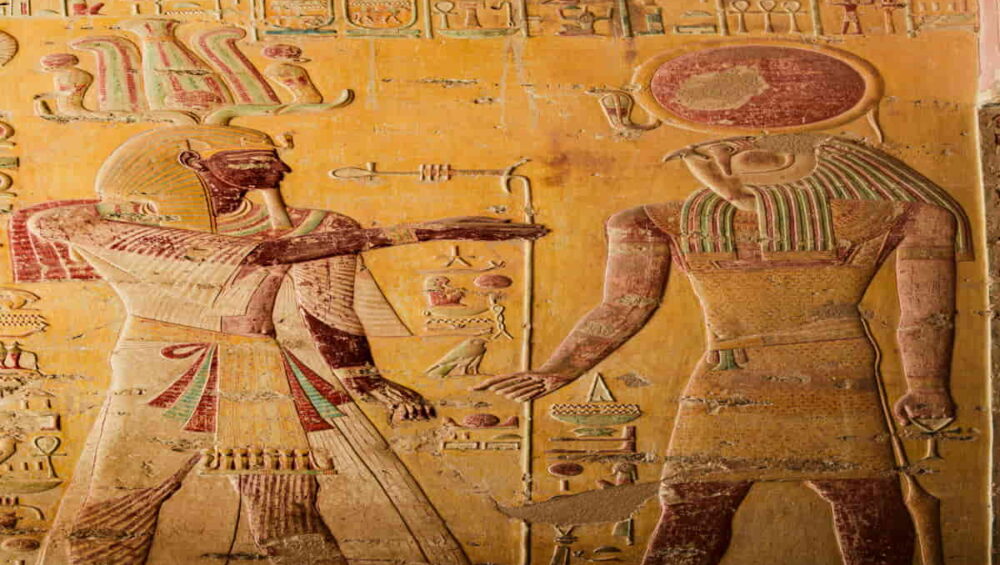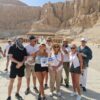Ancient Egypt, a civilization known for its impressive achievements in architecture, art, and religion, is equally famous for its rich and diverse pantheon of gods and goddesses. These deities played a central role in Egyptian life, influencing everything from politics to personal affairs. In this article, we will explore the most significant gods and goddesses of Egypt, their roles, and their impact on ancient Egyptian society.
Introduction to Egyptian Gods
The ancient Egyptians believed in a vast number of gods and goddesses, each with unique characteristics and responsibilities. These deities were seen as powerful beings who controlled natural forces and ensured the balance of the cosmos. They were not just mythical figures; they were deeply embedded in Egyptian culture and religion. The Egyptians believed that their gods lived in the temples, where priests served them daily. The gods were also thought to be present in nature, from the Nile River to the desert. Make your trip unforgettable with our enchanting Nile River cruise experiences.
Ra: The Sun God
Ra, the sun god, is one of the most important figures in Egyptian mythology. He was considered the king of the gods and the creator of all life. The Egyptians believed that Ra sailed across the sky in a boat during the day and passed through the underworld at night. This daily journey symbolized the cycle of life, death, and rebirth.
Ra was often depicted with the head of a falcon, crowned with a sun disk. He was the patron deity of the pharaohs, who were considered to be his earthly representatives. The god Ra was associated with creation and the sustaining of life, which made him a central figure in Egyptian religion.
Osiris: God of the Afterlife
Osiris, the god of the afterlife, resurrection, and fertility, is another central figure in Egyptian mythology. He was believed to be the ruler of the underworld, where the souls of the dead went for judgment. Osiris’ story is one of betrayal, death, and resurrection. According to myth, his brother Set, the god of chaos, murdered Osiris and scattered his body parts across Egypt. Osiris’ wife, Isis, and their son, Horus, worked together to resurrect him.
Osiris’ resurrection symbolized the eternal cycle of life and death. He became the god of the afterlife, and Egyptians believed that the pharaoh would become one with Osiris after death. This belief led to elaborate burial practices and the construction of tombs, where the deceased could be preserved for the afterlife.
Isis: The Protective Mother
Isis, the wife of Osiris and mother of Horus, is one of the most beloved goddesses in Egyptian mythology. She was worshipped as a goddess of magic, motherhood, and fertility. Isis was known for her wisdom and her ability to heal and protect. She played a crucial role in the resurrection of Osiris, using her magic to bring him back to life.
As a mother, Isis was a symbol of protection and nurturing. Egyptians believed she could offer comfort and aid to those in need, especially women and children. Her image often appeared in Egyptian art, where she was depicted as a woman with a throne-shaped crown, holding an ankh and a scepter. The cult of Isis spread beyond Egypt, influencing many other cultures in the Mediterranean world.
Horus: The Falcon God
Horus, the son of Osiris and Isis, is one of the most iconic gods in Egyptian mythology. He was depicted as a falcon or as a man with the head of a falcon. Horus is often associated with kingship, protection, and war. According to myth, Horus avenged his father’s death by defeating Set in a series of battles. This victory symbolized the triumph of order over chaos.
Horus was also the god of the sky and was believed to be the protector of the pharaoh. The pharaohs of Egypt were often referred to as the “Living Horus,” as they were thought to embody the god’s power on Earth. Horus’ association with the sky and kingship made him an essential figure in the Egyptian pantheon.
Anubis: The God of Mummification
Anubis, the god of mummification and the afterlife, is another important figure in Egyptian religion. He was depicted as a man with the head of a jackal, an animal often associated with cemeteries. Anubis was believed to protect the dead and oversee the process of mummification. He was also responsible for guiding souls to the afterlife, where they would face judgment before Osiris.
Anubis’ role in the mummification process was vital. The Egyptians believed that preserving the body was necessary for the soul’s survival in the afterlife. Anubis’ presence ensured that the deceased would be properly cared for and protected during their journey to the afterlife.
Set: The God of Chaos
Set, the god of chaos, disorder, and violence, was one of the most complex figures in Egyptian mythology. He was often depicted as a mysterious creature with the head of an unknown animal, sometimes referred to as the “Set animal.” Set’s primary role in Egyptian mythology was as the antagonist, representing chaos and destruction.
Despite his negative attributes, Set was not entirely evil. He was also associated with strength and was worshipped as a protector in certain regions of Egypt. However, his rivalry with Osiris and his role in causing imbalance made him one of the most feared gods in Egyptian religion. The Egyptians believed that maintaining order in society and nature required controlling Set’s chaotic influence.
Hathor: The Goddess of Love and Joy
Hathor, the goddess of love, music, dance, and joy, is one of the most adored deities in Egyptian mythology. She was often depicted as a cow or as a woman with the head of a cow, symbolizing fertility and motherhood. Hathor was seen as a nurturing and protective figure, offering comfort and happiness to her followers.
As the goddess of love, Hathor was also associated with beauty and sexuality. She was often invoked in matters of the heart and personal relationships. Hathor’s influence extended to the realm of music and dance, where she was considered the patroness of joy and celebration. Her temples were places of festivity and worship, where music and dance were an integral part of religious rituals.
Thoth: The God of Wisdom and Writing
Thoth, the god of wisdom, writing, and knowledge, played a critical role in Egyptian religion. He was depicted as a man with the head of an ibis or a baboon. Thoth was considered the inventor of writing and the scribe of the gods. He was believed to have recorded the deeds of the dead and to have helped guide souls through the afterlife.
Thoth’s wisdom was invaluable to the Egyptians, especially in matters of science, mathematics, and law. He was also associated with the moon and was thought to control the passing of time. Thoth’s role as the divine scribe made him an essential figure in the maintenance of order and knowledge in the universe.
The Role of Gods in Daily Life
The gods and goddesses of Egypt were not distant or abstract beings; they were deeply involved in the everyday lives of the ancient Egyptians. People made offerings to the gods, prayed for protection, and sought divine guidance for their actions. Temples, statues, and rituals dedicated to the gods were scattered throughout Egypt, ensuring that divine favor was always within reach.
The pharaoh, as the earthly representative of the gods, was expected to maintain harmony between the divine and mortal realms. The concept of Ma’at, which represented order, truth, and justice, was central to Egyptian society. The pharaohs were responsible for upholding Ma’at and ensuring that the gods remained pleased, as their favor was necessary for the prosperity of the kingdom.
Conclusion: The Enduring Legacy of the Gods of Egypt
The gods of Egypt left an indelible mark on the civilization’s culture, religion, and art. Their stories, symbols, and temples continue to captivate people around the world. Even though ancient Egypt no longer exists as a civilization, its gods and goddesses live on in our collective imagination. The mythology of Egypt serves as a window into a world where the divine and the human were intimately connected, where gods were not just objects of worship, but active participants in the lives of their followers.
As we look back at the gods of Egypt, we are reminded of the ancient Egyptians’ deep understanding of the natural world, their quest for knowledge, and their belief in the eternal cycle of life, death, and rebirth. The gods of Egypt may no longer be worshipped in the same way, but their influence endures, enriching our understanding of human history and culture. From the pyramids to the Nile, our trips to Egypt offer it all.




